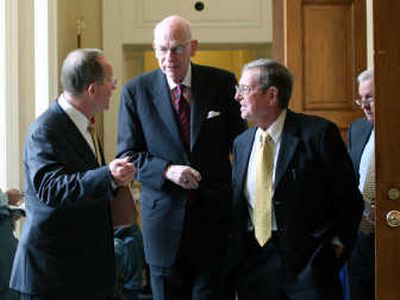GOP senators push for war changes

WASHINGTON – Senate Republicans who are fed up with the war but not ready to abandon Iraq are seeking shelter in legislation that calls for a new war strategy without ordering a troop withdrawal.
The legislative effort, which picked up momentum Wednesday, marks a major departure from the stiff defenses Republicans have mounted since January to shield the White House from the Democratic drive to pressure President Bush to bring the troops home.
And it has prompted a vigorous reaction from the White House, which has dispatched senior officials to Capitol Hill to implore Republicans to wait until September, when the administration plans to deliver a major assessment of current U.S. policy in Iraq.
But more GOP lawmakers are now putting a premium on staking out safer middle ground away from the unpopular president while still opposing a withdrawal deadline many see as irresponsible.
“They are trapped,” said veteran GOP strategist Frank Luntz. “In this day and age and in this environment, you can’t just say ‘I support the war.’ … They are trying to find a way that is politically acceptable but still allows them to stick to their guns.”
It is a politically perilous course.
The American public now overwhelmingly favors withdrawing from Iraq, not simply adjusting U.S. strategy. And anti-war activists who have been hounding GOP lawmakers for months in their home states deride the latest Republican proposals as too little too late.
“There is no refuge for any Republican until the war is over,” said Tom Matzzie, campaign manager for Americans Against Escalation in Iraq, a leading coalition against the war. “The important votes that people are going to pay attention to are the bills that end the war.”
There is small but growing Republican support for efforts to do that, as the Iraqi government continues to make little progress meeting goals outlined by Congress two months ago.
Republican Sens. Gordon Smith, of Oregon, Chuck Hagel, of Nebraska, and Olympia Snowe, of Maine, have all said they will vote for a measure that would order a withdrawal to begin within 120 days and limit the U.S. combat mission after April 30, 2008.
Wednesday, seven GOP lawmakers also backed a proposal in the Senate to mandate more time between deployments for soldiers who have served in Iraq and Afghanistan, a measure that would effectively force the Bush administration to reduce the number of troops in Iraq.
The measure, an amendment offered by Sen. Jim Webb, D-Va., a Vietnam veteran, failed 56-41 to clear the 60 votes needed.
And Maine Republican Sen. Susan Collins Wednesday joined Sen. Ben Nelson, D-Neb., sponsoring a proposal to force the administration to immediately scale back the U.S. combat mission in Iraq.
“I oppose the current strategy in Iraq and believe it is time to redefine our mission,” Collins said of the proposal, which would limit U.S. forces to protecting American personnel, training Iraqis, securing Iraq’s borders and conducting counterterrorism operations.
But the uptick in GOP support for strong measures challenging the White House still reflects only a fraction of the 49-strong Senate Republican caucus.
A majority of the caucus succeeded Wednesday in blocking two proposals to limit troop deployments. In addition to Webb’s amendment, the Senate failed, 52-45, to reach the 60 votes needed on a proposal from Hagel, another Vietnam veteran, to cap the length of time that troops could serve in Iraq.
And most Republicans, even those uncomfortable with the current policy, continue to fervently oppose setting withdrawal dates.
“It is very, very intemperate policy,” Sen. Judd Gregg, R-N.H., said on the Senate floor Wednesday, warning that it “will lead to chaos.”
Gregg is among a group of more than 40 Republican lawmakers in the House and Senate who are backing a less restrictive measure that would urge the administration to implement the Iraq Study Group report.
The bipartisan report released in December made 79 recommendations for a new strategy in Iraq. Some are very broad, such as calls for a new diplomatic initiative in the Middle East and for protecting the rights of women and minorities. Other are very specific, such as installing meters on Iraqi oil pipelines.